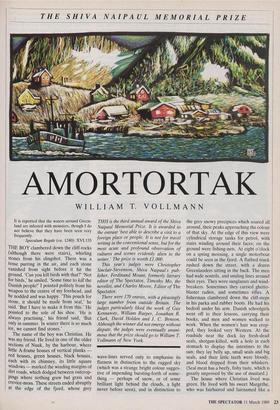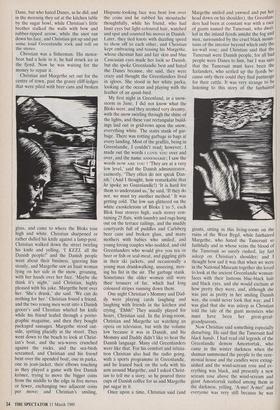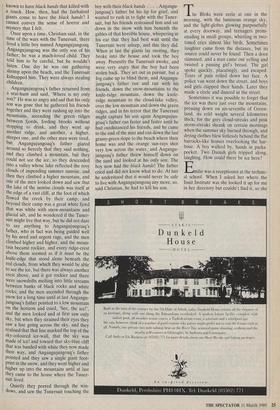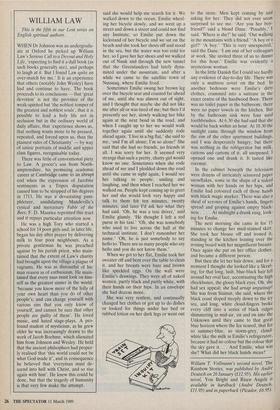THE SHIVA NAIPAUL MEMORIAL PRIZE
AMORTORTAK
WILLIAM T. ,VOLLMANN
THIS is the third annual award of the Shiva Naipaul Memorial Prize. It is awarded to the entrant 'best able to describe a visit to a foreign place or people. It is not for travel writing in the conventional sense, but for the most acute and profound observation of cultures and scenes evidently alien to the writer.' The prize is worth ,E1,000.
This year's judges were Christopher Sinclair-Stevenson, Shiva Naipaul's pub- lisher, Ferdinand Mount, formerly literary editor of The Spectator, Timothy Mo, the novelist, and Charles Moore, Editor of The Spectator.
There were 170 entries, with a pleasingly large number from outside Britain. The judges particularly liked the work of Guy Kennaway, William Raeper, Jonathan R. Clark, David Holden and J. C. Benson. Although the winner did not emerge without dispute, the judges were eventually unani- mous that the prize should go to William T. Vollmann of New York. It is reported that the waters around Green- land are infested with monsters, though I do not believe that they have been seen very frequently.
Speculum Regale (ca. 1240): XVI.135 The name of the boy was Christian. He was my friend. He lived in one of the older sections of Nuuk, by the harbour, where little A-frame houses of vertical planks — red houses, green houses, black houses, each with its chimney, its little square windows — marked the winding margins of dirt roads, which dodged between outcrop- pings where nothing grew but grass and crevice-moss. These streets ended abruptly at the edge of the fjord, whose grey wave-lines served only to emphasise its flatness in distinction to the rugged sky (which was a strange bright colour sugges- tive of impending bursting-forth of some- thing — perhaps of snow, or of some brilliant light behind the clouds, a light never before seen), and in distinction to the grey snowy precipices which soared all around, their peaks approaching the colour of that sky. At the edge of this view were cylindrical storage tanks for petrol, with stairs winding around their faces; on the ground were fishing-nets. At eight o'clock on a spring morning, a single motorboat could be seen in the fjord. A flatbed truck rushed down the street, with a dozen Greenlanders sitting in the back. The men had wide nostrils, and smiling lines around their eyes. They wore sunglasses and wind- breakers. Sometimes they carried ghetto- blaster radios, and sometimes rifles. A fisherman clambered down the cliff-steps in his parka and rubber boots. He had his bedroll under his arm. Danish schoolgirls went off to their lessons, carrying their books; and men and women walked to work. When the women's hair was crop- ped, they looked very Western. At the roadside near the dock lay fresh-dead seals, shotgun-killed, with a hole in each stomach to display the intestines to the sun; they lay belly up, small seals and big seals, and their little teeth were bloody, and blood dripped from their whiskers. (Seal meat has a beefy, fishy taste, which is greatly improved by the use of mustard.)
The house where Christian lived was green. He lived with his sweet Margethe, who was fairhaired and fairnamed like a
Dane, but who hated Danes, as he did; and in the morning they sat at the kitchen table by the sugar bowl, while Christian's little brother stalked the walls with bow and rubber-tipped arrow, while the snot ran down his face, and Christian got up and put some loud Greenlandic rock and roll on the stereo.
Christian was a fisherman. His motor- boat had a hole in it; he had struck ice in the fjord. Now he was waiting for the money to repair it.
Christian and Margethe set out for the centre of town, past the grassy cliff-ledges that were piled with beer cans and broken
glass, and came to where the Bloks rose high and white. Christian sharpened or rather dulled his knife against a lamp-post; Christian walked down the street twirling his knife and yelling, 'I KEEL all the Danish people!' and the Danish people went about their business, ignoring him stonily, and Margethe saw an Inuit woman lying on her side in the snow, groaning, with her hands over her face. 'Maybe she think it's night,' said Christian, highly pleased with his joke. Margethe bent over her. 'She's drunk,' she said. 'We can do nothing for her.' Christian found a friend, and the two young men went into a Danish grocer's and Christian whirled his knife while his friend leafed through a porno- graphic magazine, and then they bought packaged sausages. Margethe stood out- side, spitting placidly in the street. They went down to the beach to look at Christ- ian's boat, and the sea-waves crunched against the rocks, and the sea-birds screamed, and Christian and his friend bent over the upended boat, one in parka, one in jean-jacket, their elbows touching as they played a game with five Danish kroner, trying to move the bigger coins from the middle to the edge in five moves or fewer, exchanging two adjacent coins per move; and Christian's smiling, Hispanic-looking face was bent low over the coins and he rubbed his moustache thoughtfully, while his friend, who had Inuit eyes but light-coloured hair, watched and spat and counted his moves in Danish. Later, they tied knots with dazzling speed to show off to each other, and Christian kept embracing and teasing his Margethe, whose chestnut hair and fair skin and blue Caucasian eyes made her look so Danish, but she spoke Greenlandic best and hated the Danes because, she said, they were crazy and thought the Greenlanders lived in igloos. She stood in her white parka, looking at the ocean and playing with the feather of an aptak-bird.
My first night in Greenland, in a snow- storm in June, I did not know what the Bloks were, and they seemed very dreamy, with the snow swirling through the shine of the lights, and these vast rectangular build- ings laid out in grid-rows upon the snow, everything white. The stairs stank of gar- bage. There was rotting garbage in bags at every landing. Most of the graffiti, being in Greenlandic, I couldn't read; however, I made out the words I LOVE YOU over and over, and the name ANNEMARIE; I saw the words How ARE YOU? 'They are at a very low level,' said the Danish administrator. earnestly. 'They often do not speak Dan- ish.' (And I thought, how remarkable that he spoke no Greeniandic!) 'It is hard for them to understand us,' he said. 'If they do not, we must try another method.' It was getting cold. The low sun glittered on the white exoskeletons of Bloks 1 to 5, each Blok four storeys high, each storey con- taining 25 flats, with laundry and rugs hung Out on the terrace railings, and the muddy courtyards full of puddles and Carlsberg beer cans and broken glass, and many mothers with babies who smiled, and young loving couples who nodded, and old Greenlanders who would give you tea or beer or fish or seal-meat, and giggling girls in their ski jackets, and occasionally a young man drunkwalking, unseeing, mov- ing his fist in the air. The garbage stank. Sometimes the older women still wore their trousers of fur, which had long coloured stripes running down them.
One night Christian's Mommy and Dad- dy were playing cards laughing and laughing with friends in the kitchen and crying, Ehhh!' They usually played for hours, Christian said. In the living-room, Christian and Margethe sat watching an opera on television, but with the volume low because it was in Danish, and his Mommy and Daddy didn't like to hear the Danish language. Many old Greenlanders were like that. For his comfort and relaxa- tion Christian also had the radio going, with a sports programme in Greenlandic, and he leaned back on the sofa with his arm around Margethe, and I asked Christ- ian to tell me a story, so he poured three cups of Danish coffee for us and Margethe put sugar in it.
Once upon a time, Christian said (and
Margethe smiled and yawned and put her head down on his shoulder), the Greenlan- ders had been at constant war with a race of giants named the Tunersuit, who dwel- led in the inland fjords amidst the fog and mist, surrounded by the cruel black moun- tains of the interior beyond which only the ice-wall rose; and Christian said that the Tunersuit were Danish people, for all bad people were Danes to him, but I was sure that the Tunersuit must have been the Icelanders, who settled up the fjords be- cause only there could they find pasturage for their cattle. It was very strange to be listening to this story of the fairhaired
giants, sitting in this living-room on the ruins of the West Bygd, while fairhaired Margethe, who hated the Tunersuit so faithfully and in whose veins the blood of the Tunersuit so surely rushed, lay fast asleep on Christian's shoulder; and I thought how sad it was that when we were in the National Museum together she loved to look at the ancient Greenlandic woman- faces with their lustrous blue-black hair and black eyes, and she would exclaim at how pretty they were, and, although she was just as pretty in her smiling Danish way, she could never look that way; and I was glad that she was asleep as Christian told the tale of the giant monsters who must have been her great-great- grandparents.
Now Christian said something especially disturbing. He said that the Tunersuit had black hands. I had read old legends of the Greenlandic demon Amortortak, who came in the winter darkness when the shaman summoned the people to the cere- monial house and the candles were exting- uished and the wind-scream rose and ev- erything was black, and presently a new scream rose above the wind-scream and giant Amortortak rushed among them in the darkness, yelling, 'A-mo! A-mo!' and everyone was very still because he was known to have black hands that killed with a touch. How, then, had the fairhaired giants come to have the black hands? I cannot convey the sense of horror and mystery that I felt.
Once upon a time, Christian said, in the time of the wars with the Tunersuit, there lived a little boy named Angangujungoaq. Angarigujungoaq was the only son of his father; he was a much-loved child. They told him to be careful, but he wouldn't listen. One, day he was out gathering Shrimp upon the beach, and the Tunersuit kidnapped him. They were always stealing Children.
Angangujungoaq's father returned from a seal-hunt and said, 'Where is my only son?' He.was so angry and sad that his only son was gone that he gathered his friends together and they went rushing up inni the mountains, ascending , the green ridges between fjords, fording brooks without stopping to drink, and they went up another ridge, and another, a higher, steeper one, and the other men were tired, but Angangujungoaq's father glared around so fiercely that they said nothing, and they climbed a mountain, but they could not see the ice, so they descended into a valley whose lake reflected the rosy Clouds of impending summer sunrise, and then they climbed a higher mountain, and one of the men looked down and saw that the lake of the sunrise clouds was itself at the edge of a vast cliff, at the foot of which flowed the creek by their camp, and beyond their camp was a great white fjord that was white with snow-mountains and glacial silt, and he wondered if the Tuner- suit might live that way, but he did not dare to say anything to Angangujungoaq's father, who in fact was being guided well by his need and urgent rage, and the men climbed higher and higher, and the moun- tain became rockier, and every ridge-crest above them seethed as if it must be the knife-edge that stood alone beneath the red clouds, from which they would be able to see the ice, but there was always another crest. dbove, and it got rockier and there were snowdrifts melting into little streams between banks of black rocks and white rocks; and the men ascended through the snow for a long time until at last Angangu- jungoaq's father pointed to a low Mountain on the, horizon and cried, 'See, the ice!', and the men looked and at first saw only Sky, but when they strained their eyes they saw a line going across the sky, and they realised that that line marked the top of the sky-coloured ice-wall, that the sky was made of ice and toward that sky-blue cliff that was banded with white they now made their way, and Angangujungoaq's father Pointed and they saw a single giant foot- print in the snow, and they went higher and higher up into the mountains until at last they came to the house where the Tuner- suit lived.
Quietly they peered through the win- dows, and saw the Tunersuit touching the
boy with their black hands . . Angangu- jungoaq's father bit his lip for grief, and wanted to rush in to fight with the Tuner- suit, but his friends restrained him and sat down in the snow with him beneath the gables of that horrible house, whispering in his ear that they had best wait until the Tunersuit were asleep, and this they did. When at last the giants lay snoring, they broke into the house and took the boy away. Presently the Tunersuit awoke, and were very angry that the boy had been stolen back. They set out in pursuit, but a fog came up to blind them, and Angangu- jungoaq's father ran and ran with his friends, down the snow-mountains to the knife-ridge mountain, down the knife- ridge mountain to the cloud-lake valley, over the low mountain and down the green ridges, and in his terror that the Tunersuit might capture his son again Angangujun- goaq's father ran faster and faster until he had outdistanced his friends, and he came to the end of the mist and ran down the last grassy-green slope to the beach where their home was and the orange sun-rays shot very low across the water, and Angangu- jangoaq's father threw himself down on the sand and looked at his only son. The boy now had the black hands! The father cried and did not know what to do. At last he understood that it would never be safe to live with Angangujungoaq any more, so, said Christian, he had to kill his son. The Bloks were eerie at one in the morning, with the luminous orange sky, and the light-globes glowing purposefully at every doorway, and teenagers prom- enading in small groups, whistling in two- toned cries almost like birds. Sometimes
laughter came from the distance, but its source could never be found. Then a door slammed, and a man came out yelling and twisted a passing girl's breast. The girl spoke quickly, placatingly, and escaped. Tears of pain rolled down her face. A police van went down the street, and boys and girls clapped their hands. Later they made a circle and danced in the street.
Sometimes it was possible to forget that the ice was there just over the mountains, pressing down on six-sevenths of Green- land, its cold weight several kilometres thick; for the grey cloud-streaks and pink storm-streaks shrank on certain mornings when the summer sky burned through, and drying clothes blew listlessly behind the flat barracks-like houses overlooking the har- bour. A boy walked by, hands in parka pocket. Two Danish girls tripped along, laughing. How could there be ice here?
Ern
ilie was a receptionist at the technic- al school. When I asked her where the Inuit Institute was she looked it up for me in her directory but couldn't find it, so she said she would help me search for it. We walked down to the ocean, Emilie wheel- ing her bicycle slowly, and we went up a street and down a street and could not find any Institute, so Emilie put down the kickstand of her bicycle and we sat on the beach and she took her shoes off and stood in the sea, but the water was too cold for her, so I gave her her shoes and we walked out of Nut* and through the new tunnel that the Greenlanders had lately dyna- mited under the mountain, and after a while we came to the satellite town of Nussuaq, where Emilie lived.
Sometimes Emilie swung her brown leg over the bicycle seat and coasted far ahead of me, until she was almost out of sight, and I thought that maybe she did not like me after all or was tired of me; but then I'd presently see her, slowly walking her bike again at the next bend in the road, and when I caught up to her we would walk together again until she suddenly rode ahead again. 'I live in a big flat,' she said to me, 'and I'm all alone; I'm so alone!' She said that she had no friends, no friends at all. I was sorry for her. It seemed very strange that such a pretty, chatty girl would know no one. Sometimes when she rode ahead of me and I plodded down the road until she came in sight again, I would see her talking to people, smiling and laughing, and then when I reached her we walked on. People kept coming up to greet her and she .would look very happy and talk to them for ten minutes, twenty minutes, and later Pd. ask her what they had said. 'Oh, he was a taxi driver,' said Emilie glumly. 'He thought I left a red purse in his taxi."Oh, she was somebody who used to live across the hall at the technical institute. I don't remember her name."Qh, he is just somebody to say hello to. There are so many people who say hello and you do not know them.'
When we got to her flat, Emilie took her sweater off and bent over the table to clean it, and her breasts were bare and brown like speckled eggs. On the wall were Emilie's drawings. They were all of naked women, partly black and partly white, with their hands on their hips. In an envelope she tad dozens more.
She was very restless, and continually changed her clothes or got up to do dishes or looked for things under her bed or rubbed lotion on her dark legs or went out
to the store. Men kept coming by and asking for her. They did not ever seem surprised to see me. 'Are you her boy- friend?' said a blond Dane. 'Possibly,' I said. 'Where is she?' he said. 'Out walking in the mountains with a friend.' A boy or a girl?' A boy.' This is very unexpected,' said the Dane. 'I am one of her colleagues at work. She invited three of us to dinner for this hour.' Emilie was evidently a mysterious woman.
In the little Danish flat I could see hardly any evidence of day-to-day life. There was only a mattress cover on the bed. In another bedroom were Emilie's dirty clothes, crammed into a suitcase in the exact centre of the hardwood floor. There was no toilet paper in the bathroom; there were no paper towels in the kitchen. But by the bathroom sink were four used toothbrushes. At 6.30 she had said that she would be back within an hour. At 10.30 the sunlight came through the window from the rim of the other apartment buildings, and I was desperately hungry, but there was nothing in the refrigerator but milk, cartons and cartons of it, all unopened. I opened one and drank it. It tasted like coconut.
In the cabinet beneath the television were dozens of intricately scissored paper snowflakes, some in the shape of a naked woman with her hands on her hips, and Emilie had coloured each of those hands with black magic marker. There was also a sheaf of xeroxes of Emilie's hands, fingers spread and groping against empty black- ness . . . . At midnight a drunk rang, look- ing for Emilie. The next morning she came in for 15 minutes to change her mud-stained skirt. She took her blouse off and ironed it, standing in the kitchen leaning over the ironing board with her magnificent breasts. Once again she put on her office clothes, and became a different person. But then she let her hair down, and for a moment I thought she looked like a Skrwl- ing, for that long, lush, blue-black hair fell around her oval face, accentuating the high cheekbones, the glossy black eyes. Oh, she had sex appeal; she had arnap angutinap! She was from Sisimut, she said, where the black coast sloped steeply down to the icy sea, and long, white cloud-fingers broke every cliff into a series of black ridge shimmering in mid-air, on and on into the Unknown until they came to that grea blue horizon where the Ice reared, that Ice so summer-blue, so storm-grey, cloud white like the milk in Emilie's refrigerator because it had no colour but the colour tha the sky gave it... . And Emilie, what wa she? What did her black hands mean?
William T. Vollmann's second novel, The Rainbow Stories, was published by Andr Deutsch on 26 January (£12.95). His earlie novel, You Bright and Risen Angels i available in hardback (Andre Deutsch £11.95) and in paperback (Picador, £6.95)





























































 Previous page
Previous page